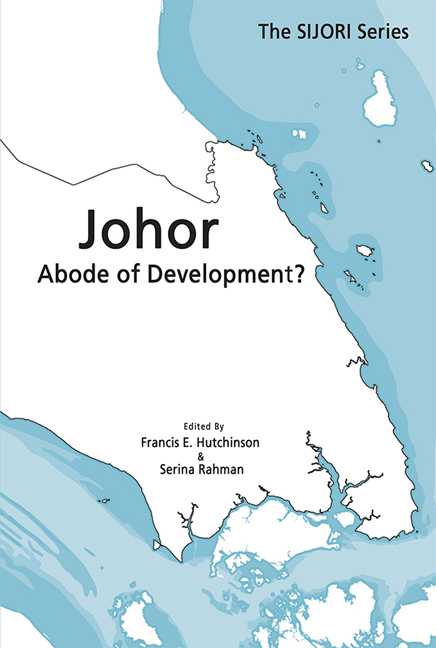4 - Johor’s Oil and Gas Sector: The Pengerang Integrated Petroleum Complex and Its Implications
Published online by Cambridge University Press: 24 November 2020
Summary
INTRODUCTION
Malaysia`s Economic Transformation Program aims to propel the country to highincome status by 2020. Behind Indonesia, the country is the second largest oil and gas producer in Asia and aspires to become a regional hub in oil and gas (PWC 2017; MIDA 2017). Johor stands at the forefront of this endeavour, as the state aims to become a regional oil and gas storage and trading hub. This will be done by attracting major international investments and increasing petrochemical output.
These goals are also integrated into Iskandar Malaysia's development plan. The Iskandar Malaysia (IM) region was launched in 2006 and is one of five economic corridors promoted by the federal government. The Comprehensive Development Plan II (2014–25) for the region plans “to develop an environmentally friendly petrochemical and oil and gas cluster” and stresses the importance of its proximity to Singapore's petrochemical complex on Jurong Island.
The flagship project that will turn this vision into reality is the Pengerang Integrated Petroleum Complex (PIPC), a Petronas-led project with envisaged investments of US$27 billion. The PIPC was inspired by the Amsterdam-Rotterdam- Antwerp (ARA) model of maritime activity, port network and oil supply chain connectivity. The ARA is vital to Northern European oil and gas bunkering and transport. Partners of the PIPC such as the Dialog Group projected that “in 20 years Pengerang could surpass Rotterdam” (Huong 2012).
Against this background, the aims of this chapter are to explore the evolution of Johor's petrochemical industry vis-à-vis Singapore and to examine the developmental impacts of the PIPC. This chapter intends to answer the following research questions:
1. What are the functional and sectoral specializations of Johor's oil and gas industry?
2. What is the rationale behind the PIPC?
3. How does Johor compete or complement Singapore in attracting foreign direct investment?
4. What are the developmental impacts of the PIPC?
5. Can the PIPC succeed?
Methodologically, we applied a mixed methods approach. The FDI Markets database is used to illustrate investment flows to Johor on a quantitative basis. Qualitative insights have been gathered through literature and newspaper reviews. In addition, we conducted nineteen expert interviews with managers of multinational enterprises, consultants and development agencies between autumn 2016 and spring 2018 to gain a better understanding of the rationale behind the foreign investment. The interviewed enterprises cover all segments of the oil and gas production network, including upstream, midstream and downstream activities.
- Type
- Chapter
- Information
- JohorAbode of Development?, pp. 107 - 133Publisher: ISEAS–Yusof Ishak InstitutePrint publication year: 2020

